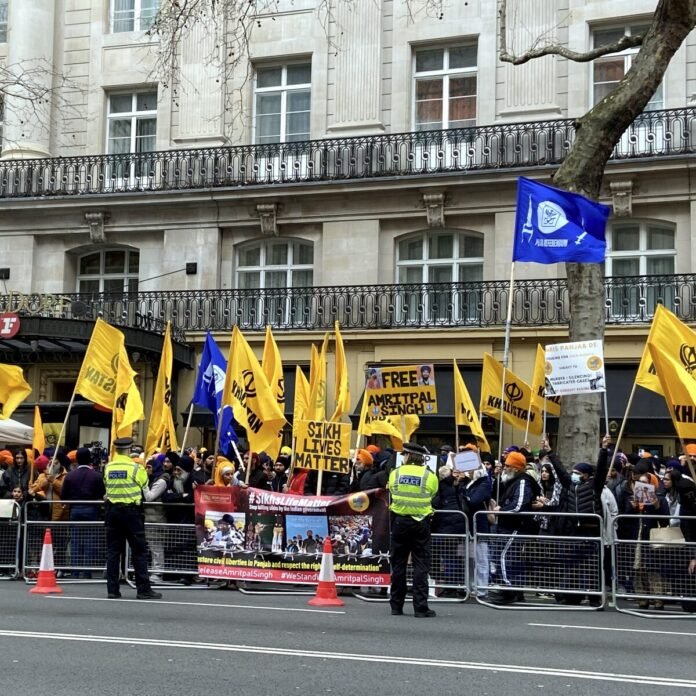India’s High Commissioner to Ottawa, Sanjay Kumar Verma, found himself embroiled in a tense situation as he attended a meeting with a local trade board in British Columbia on Friday evening. The event, intended to foster economic ties between India and Canada, was disrupted by protests orchestrated by pro-Khalistan elements. The presence of Sikh for Justice (SFJ) activists outside the venue added an air of tension to the proceedings.
The meeting, aimed at discussing potential trade opportunities and strengthening bilateral relations, was marred by the disruptive actions of the protesters. Despite efforts to maintain decorum and conduct productive discussions, the demonstrators’ chants and slogans reverberated outside the venue, creating a chaotic atmosphere.
Sanjay Kumar Verma, representing India’s interests in Canada, remained steadfast in his commitment to engage with the local community and promote mutual understanding. However, the presence of the protesting groups posed a challenge to the diplomatic proceedings and underscored the ongoing tensions surrounding the issue of Khalistan.
The SFJ, a controversial organization advocating for an independent Sikh state, has been actively campaigning for its cause in various countries, including Canada. Their presence at the event sent ripples across diplomatic circles and raised concerns about the potential impact on India-Canada relations.
As the protests unfolded, security personnel were deployed to maintain order and ensure the safety of all attendees. Despite the disruptions, the meeting continued, albeit under heightened security measures and with a palpable sense of unease lingering in the air.
The incident highlights the complexities of diplomatic engagements in the face of political activism and ideological differences. While dialogue and engagement are essential for resolving disputes and fostering cooperation, such disruptions underscore the challenges posed by external influences and divergent interests.
In response to the protests, Indian officials reiterated their commitment to engaging with all stakeholders in a constructive manner while upholding the principles of sovereignty and territorial integrity. The incident serves as a reminder of the importance of maintaining open channels of communication and addressing grievances through peaceful means.
In the aftermath of the event, discussions have ensued regarding the implications of the protests on diplomatic relations between India and Canada. Indian officials have expressed their disappointment over the disruption of the meeting, emphasizing the need for mutual respect and adherence to diplomatic protocols.
The incident has also reignited debates surrounding the issue of Khalistan and the role of separatist groups in diaspora communities. While some view the protests as a legitimate expression of dissent and advocacy for self-determination, others have condemned them as disruptive and detrimental to constructive dialogue.
In response to the protests, the Canadian government has reaffirmed its commitment to upholding freedom of expression while maintaining public order. However, officials have also stressed the importance of ensuring that protests remain peaceful and do not impede diplomatic engagements or infringe upon the rights of others.
The incident has prompted calls for greater dialogue and understanding between all parties involved, including the Indian government, Sikh communities, and advocacy groups. Efforts to address underlying grievances and foster meaningful dialogue are seen as crucial steps towards resolving tensions and promoting reconciliation.
Moving forward, both India and Canada are expected to assess the situation and explore ways to prevent similar disruptions in the future. This may involve enhanced security measures, increased engagement with affected communities, and a renewed commitment to addressing the root causes of discontent.
Despite the challenges posed by the protests, the broader relationship between India and Canada remains strong, with cooperation in various fields, including trade, education, and technology, continuing to flourish. Both countries are likely to remain committed to maintaining constructive and mutually beneficial ties despite occasional obstacles along the way.

